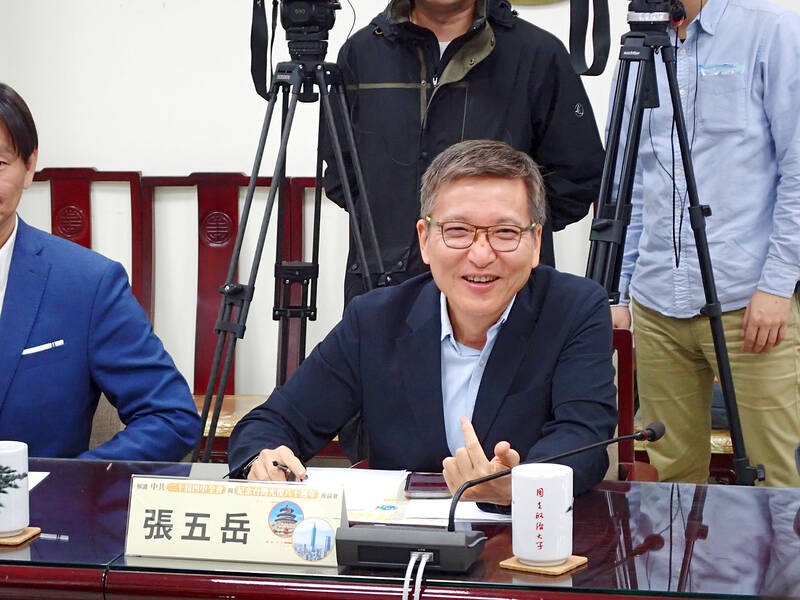The US would not give up on Taiwan in the short term and would not reach a major deal on cross-strait issues when US President Donald Trump and Chinese President Xi Jinping (習近平) meet in South Korea on Thursday, an academic said yesterday.
Trump has said he would bring up Taiwan in his talks with Xi, while US Secretary of State Marco Rubio on Sunday said the US would not seek a favorable trade agreement with China at the price of “walking away from Taiwan.”
Trump-Xi talks create unease with Taiwanese as the US president’s behavior is unpredictable, which has been compounded by US tariffs and his pressure on Taiwan Semiconductor Manufacturing Co to expand investments in the US, an official familiar with Chinese “united front” tactics said.

Photo: Chen Fu-yu, Taipei Times
That is why Rubio made public remarks that the meeting would not put Taiwan at stake, they said.
The Chinese Communist Party (CCP) wants Washington to support its anti-Taiwanese independence position, but China’s assertion that it could take Taiwan by force complicates the problem, the official said.
“Anyone who does not support cross-strait ‘reunification,’ including those who support the Republic of China, can be accused [by the CCP] of ‘supporting Taiwanese independence,’” they said.
US skepticism sentiment has risen in Taiwan as the CCP spreads news ahead of the talks, they added.
However, Washington would be going against the “six assurances” it pledged to Taiwan in a 1982 joint communique if it were to join China in opposing Taiwanese independence, they said.
Tamkang University Center for Cross-Strait Relations director Chang Wu-ueh (張五岳) said at a seminar at National Chengchi University’s Institute of International Relations that Taiwan is the most sensitive, most important issue between the US and China, but it is not the most urgent matter, and therefore would not be prioritized in this week’s talks.
Compared with other issues that could have severe consequences — such as those concerning tariffs, trade, economics and technology — the Taiwan-US relationship has not been at the center of the current conflict between the US and China, he said.
Although Beijing would prefer Washington to shift to an “anti-Taiwanese independence” stance and would elaborate on its so-called cross-strait “reunification” policy during the talks, both sides know they must minimize disagreements and avoid miscalculations, Chang said.
The talks are unlikely to result in a major agreement on cross-strait issues, he added.
The two countries still lack mutual trust, he said.
Xi does not have any bargaining chip good enough to satisfy Trump, and there are also disagreements in China about whether Trump is credible, he said.

A preclearance service to facilitate entry for people traveling to select airports in Japan would be available from Thursday next week to Feb. 25 at Taiwan Taoyuan International Airport, Taoyuan International Airport Corp (TIAC) said on Tuesday. The service was first made available to Taiwanese travelers throughout the winter vacation of 2024 and during the Lunar New Year holiday. In addition to flights to the Japanese cities of Hakodate, Asahikawa, Akita, Sendai, Niigata, Okayama, Takamatsu, Kumamoto and Kagoshima, the service would be available to travelers to Kobe and Oita. The service can be accessed by passengers of 15 flight routes operated by

Chinese spouse and influencer Guan Guan’s (關關) residency permit has been revoked for repeatedly posting pro-China videos that threaten national security, the National Immigration Agency confirmed today. Guan Guan has said many controversial statements in her videos posted to Douyin (抖音), including “the red flag will soon be painted all over Taiwan” and “Taiwan is an inseparable part of China,” and expressing hope for expedited reunification. The agency last year received multiple reports alleging that Guan Guan had advocated for armed reunification. After verifying the reports, the agency last month issued a notice requiring her to appear and explain her actions. Guan

GIVE AND TAKE: Blood demand continues to rise each year, while fewer young donors are available due to the nation’s falling birthrate, a doctor said Blood donors can redeem points earned from donations to obtain limited edition Formosan black bear travel mugs, the Kaohsiung Blood Center said yesterday, as it announced a goal of stocking 20,000 units of blood prior to the Lunar New Year. The last month of the lunar year is National Blood Donation Month, when local centers seek to stockpile blood for use during the Lunar New Year holiday. The blood demand in southern Taiwan — including Tainan and Kaohsiung, as well as Chiayi, Pingtung, Penghu and Taitung counties — is about 2,000 units per day, the center said. The donation campaign aims to boost

The Central Weather Administration (CWA) said a magnitude 4.9 earthquake that struck off the coast of eastern Taiwan yesterday was an independent event and part of a stress-adjustment process. The earthquake occurred at 4:47pm, with its epicenter at sea about 45.4km south of Yilan County Hall at a depth of 5.9km, the CWA said. The quake's intensity, which gauges the actual effects of a temblor, was highest in several townships in Yilan and neighboring Hualien County, where it measured 4 on Taiwan's seven-tier intensity scale, the CWA said. Lin Po-yu (林柏佑), a division chief at the CWA's Seismological Center, told a news conference